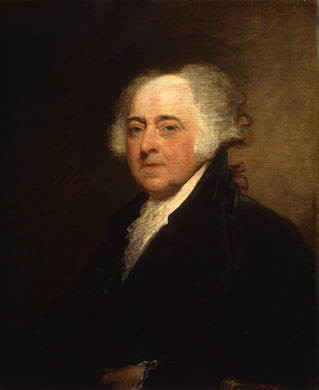John Adams citáty a výroky
John Adams: Citáty v angličtine
“Old minds are like old horses; you must exercise them if you wish to keep them in working order.”
As quoted by Josiah Quincy III, in Looking Toward Sunset : From Sources Old and New, Original and Selected (1865) by Lydia Maria Francis Child, p. 431
Attributed
Letter to Thomas Jefferson (2 January 1789), The Papers of Thomas Jefferson.
1780s
1770s, Boston Massacre trial (1770)
Kontext: It is more important that innocence be protected than it is that guilt be punished, for guilt and crimes are so frequent in this world that they cannot all be punished.
But if innocence itself is brought to the bar and condemned, perhaps to die, then the citizen will say, "whether I do good or whether I do evil is immaterial, for innocence itself is no protection," and if such an idea as that were to take hold in the mind of the citizen that would be the end of security whatsoever.
Adams as portrayed in the musical 1776 (1969); this has sometimes been cited as an actual quote of Adams.
Misattributed
Letter LV: Conclusion http://www.constitution.org/jadams/ja1_55.htm
1780s, A Defence of the Constitutions of Government (1787)
John Adams: John Adams Library (Boston Public Library) BRL; Du Ryer, André, ca. 1580-ca. 1660, tr; Adams, John, 1735-1826, former owner, "[ 2013-05-01 http://ia700200.us.archive.org/4/items/korancommonlycal00john/korancommonlycal00john.pdf, The Koran : commonly called the Alcoran of Mahomet (1806)]," Springfield [Mass.] : Printed by Henry Brewer, for Isaiah Thomas, Jun.
1770s
(26 July 1796).
1750s, Diaries (1750s-1790s)
“I had heard my father say that he never knew a piece of land run away or break.”
Autobiography (1802–1807)
1800s
1790s, Inaugural Address (Saturday, March 4, 1797)
“There are few people in this world with whom I can converse.”
As quoted in Complete Book of U.S. Presidents (1984), by William A. DeGregorio, pp. 19–20
“A government of laws, and not of men.”
No. 7; this was incorporated into the Massachusetts Constitution in 1780
1770s, Novanglus essays (1774–1775)
Reply to an invitation to 50th Independence Day celebrations from a committee of the citizens of Quincy, Massachusetts (7 June 1826); quoted in "Eulogy, Pronounced at Bridgewater, Massachusetts" http://books.google.com/books?vid=OCLC02570179&id=17ge0_OSAfIC&pg=RA1-PA160&lpg=RA1-PA160&dq=%22solemn+services+of+that+day+on+which+will+be+completed+%22&num=100 (2 August 1826) by John A. Shaw, in A Selection of Eulogies, Pronounced in the Several States, in Honor of Those Illustrious Patriots and Statesmen, John Adams and Thomas Jefferson (1826) http://www.gutenberg.org/files/18196/18196.txt
1820s
This is attributed to Adams in The Life of Thomas Jefferson (1858) by Henry Stephens Randall, p. 587
1780s, A Defence of the Constitutions of Government (1787)
1810s, Letter to William Tudor (1818)
“Thanks be to God, that he gave me Stubborness, when I know I am right.”
Letter to Edmund Jenings, 27 September 1782 http://founders.archives.gov/documents/Adams/06-13-02-0217, also quoted in John Adams (2008) by David McCullough, p. 272
1780s
These were times, my friend, in Boston, which tried women's souls as well as men's.
Letter http://www.readme.it/libri/Letteratura%20Inglese/SELECTIONS%20FROM%20ADAM'S%20CORRESSPONDENCE.shtml to Benjamin Rush (12 April 1809)
1800s
26 April 1779
1750s, Diaries (1750s-1790s)
(18 February 1756)
1750s, Diaries (1750s-1790s)
Kontext: Spent an hour in the beginning of the evening at Major Gardiner's, where it was thought that the design of Christianity was not to make men good riddle-solvers, or good mystery-mongers, but good men, good magistrates, and good subjects, good husbands and good wives, good parents and good children, good masters and good servants. The following questions may be answered some time or other, namely, — Where do we find a precept in the Gospel requiring Ecclesiastical Synods? Convocations? Councils? Decrees? Creeds? Confessions? Oaths? Subscriptions? and whole cart-loads of other trumpery that we find religion incumbered with in these days?
1810s, Letter to William Tudor (1818)
Vol. I, Preface, p. xi
1780s, A Defence of the Constitutions of Government (1787)
Attributed to Adams in A Brief History of Disbelief BBC Four (2005) by Jonathan Miller, Online video http://www.veoh.com/series/briefhistoryofdisbelief. The two sentences are derived from two different letters to Thomas Jefferson, written five years apart, juxtaposed to give a misleading impression of Adams' meaning. The first comes from his letter of 17 January 1820, and the second from his letter of 22 January 1825.
Misattributed
“A pen is certainly an excellent instrument to fix a man's attention and to inflame his ambition.”
14 November 1760
1750s, Diaries (1750s-1790s)
“It is folly to anticipate evils, and madness to create imaginary ones.”
4 August 1796
1750s, Diaries (1750s-1790s)
Letter http://www.masshist.org/digitaladams/aea/cfm/doc.cfm?id=L17770316ja to Abigail Adams (16 March 1777)
1770s
“There is, in the human Breast, a social Affection, which extends to our whole Species.”
Letter to Abigail Adams http://scholarship.kentlaw.iit.edu/cgi/viewcontent.cgi?article=2785&context=cklawreview (19 October 1775). Reprinted in I ADAMS FAMILY CORRESPONDENCE 318 (L. Butterfield ed. 1963).
1770s
“A mob is still a mob, even if it's on your side.”
Adams as portrayed in the HBO Miniseries John Adams (2008); this has sometimes been cited as having been actually said or written by the historical John Adams.
Misattributed
“Virtue is not always amiable. Integrity is sometimes ruined by prejudices and by passions.”
9 February 1779
1750s, Diaries (1750s-1790s)
